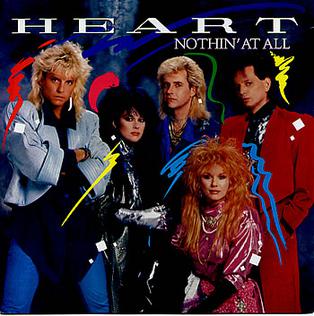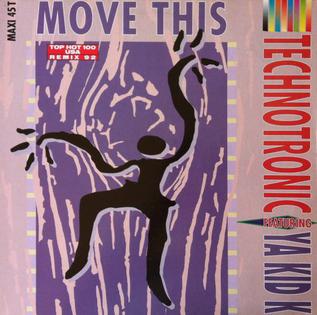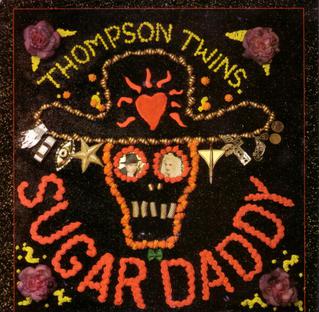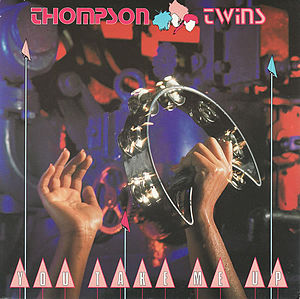
"Welcome to the Pleasuredome" is the title track to the 1984 debut album by British band Frankie Goes to Hollywood. The lyrics of the song were inspired by the poem Kubla Khan by Samuel Taylor Coleridge.

The Crossing is the debut album released by Scottish band Big Country. The album reached #3 in the UK; overseas, it hit #4 in Canada on the RPM national Top Albums Chart and #18 in the US on the Billboard 200 in 1983. It went on to be certified platinum in the UK and Canada. It contains the song "In a Big Country" which is their only U.S. Top 40 hit single. Adamson and fellow guitarist Watson used the MXR Pitch Transposer 129 effect pedal to create a guitar sound reminiscent of bagpipes. Also contributing to the band's unique sound was their use of the e-bow, a hand-held device which, through the use of magnets, causes the strings of an electric guitar to vibrate producing a soft attack which sounds more like strings or synthesizer.

"I Want That Man" is a 1989 song recorded by the American singer Deborah Harry. The song was released as the lead single from her third solo album, Def, Dumb & Blonde and was the first record Harry released in which she reverted to using Deborah as her name instead of Debbie. It became a hit in several territories, reaching number two in Australia and on the US Billboard Modern Rock Tracks chart. The single also became a top-twenty hit in Ireland, New Zealand and the United Kingdom.

"Chain Reaction" is a song by Diana Ross, released on November 28, 1985, as the second single from her sixteenth studio album Eaten Alive. The song was written by the Bee Gees and contains additional vocals from Barry Gibb. Sonically, "Chain Reaction" is an R&B and dance-pop song. According to the Gibbs' biography, the brothers had initial reservations about offering the song to Ross in case it was too Motown-like for her.
Rise Robots Rise is an American experimental hip-hop band, signed to TVT in the early 1990s, and later to Fibre Productions. The songs of Spawn are credited to J. Mendelson and B. Nitze. Tracey Amos, Michelle Johnson and Paulisa Moorman are featured on guest vocals.

"Nothin' at All" is a song written by Mark Mueller and recorded by rock band Heart. A Billboard Hot 100 Top 10 hit peaking at #10, it was released as the fourth single from the band's self-titled 1985 album Heart, and was the fourth song from the album to hit the U.S. Top 10. It also was a Top 40 hit in the UK, peaking at #38 in 1988.

Ross is the ninth studio album by American singer Diana Ross, released on September 3, 1978 by Motown Records. The album served as a new album and a compilation, as it was a mixture of old and new songs. Side A consisting of four new tracks recorded in 1978, and Side B of material recorded by Ross between 1971 and 1975, but remixed and/or extended by Motown in-house producer Russ Terrana specifically for the Ross album. Ross peaked at number 49 on the US Pop Albums chart, and number 32 on Black Albums. The album failed to chart in the UK. Its final US sales figures stood at around 150,000 copies. The cover illustration was by Rickey Ricardo Gaskins. A different album also titled Ross was released on the RCA label in 1983.

Here's to Future Days is the fifth studio album by the British pop group Thompson Twins. It was the third and final release for the band as a trio, which was their most successful and recognisable line-up. Released in September 1985, it peaked at no. 5 in the UK, and no. 20 in the US.

Big Trash is the seventh studio album by the British pop group the Thompson Twins, released in 1989 by Warner Brothers/Red Eye. It was produced by Tom Bailey and Alannah Currie, with two tracks produced by Steve Lillywhite.

"Believe Again" is a New Age and electronica-influenced pop song written by Delta Goodrem, Brian McFadden, Stuart Crichton and Tommy Lee James and Nigel Hove produced by Stuart Crichton and Marius de Vries for Goodrem's third studio album Delta (2007). The single, released in Australia on 8 December 2007, features exclusive remixes and the unreleased B-side track, "Fortune and Love". The single was released to radio on 12 November 2007, although it had its premiere on commercial radio in late-October 2007.

"Korean Bodega" is a single released in 1999, and was the final single taken from Fun Lovin' Criminals's second album 100% Colombian.

The Complete Stevie Wonder is a digital compilation featuring the work of Stevie Wonder. Released a week before the physical release of A Time to Love, the set comprises almost all of Wonder's officially released material, including single mixes, extended versions, remixes, and Workout Stevie Workout, a 1963 album which was shelved and replaced by With a Song in My Heart. The set also contains a digital (PDF) booklet and three music videos: "Overjoyed", "Part-Time Lover" and "So What the Fuss".

"Love Train" is a song by English singer Holly Johnson, released in 1989 as the lead single from his debut solo album Blast. It was written by Johnson, and produced by Andy Richards and Steve Lovell, with additional production by Stephen Hague. The song reached No. 4 in the UK, spending 11 weeks on the chart, and was certified Silver by BPI in February 1989. In the US, the song reached No. 65 on the Billboard Hot 100.

"Romeos" is the first single from Alphaville's 1989 album The Breathtaking Blue. It was released a month ahead of the album, and was the first single by Alphaville to be released as a CD single, previous singles having preceded the format's rise in popularity.

"Move This" is a 1992 hit by Technotronic featuring Ya Kid K, which reached #6 on the Billboard Hot 100. This song also appears on Technotronic's debut album Pump Up the Jam: The Album, which was released in 1989. While the full-length album version has a running time of 5 minutes and 19 seconds, it was re-recorded with updated synths and shortened to 3 minutes and 46 seconds for the radio edit version, this version is referred as "Bogaert's 7" Remix" on the CD single. The video version, also known as the "Hit Mix" is a 3:40 edit of the album version. The version on the album's vinyl release is the same as the original album version, but faded out starting from 4:48.

"Sugar Daddy" is a song by British pop group Thompson Twins, released in 1989 as the lead single from their seventh studio album Big Trash. It was written and produced by Alannah Currie and Tom Bailey. The single's B-Side, "Monkey Man", was exclusive to this single.

"Come Inside" is a song by British pop group Thompson Twins, released in 1991 as the lead single from their eighth studio album Queer. It was written and produced by Alannah Currie and Tom Bailey. The single peaked at No. 56 in the UK and spent four weeks on the chart. The single also peaked at No. 7 on the US Billboard Dance Music/Club Play Singles Chart. The single had a music video filmed to promote it.

"Lay Your Hands on Me" is the first single released from the album Here's to Future Days by the British band Thompson Twins. Written by Tom Bailey, Alannah Currie, and Joe Leeway, it was released in the UK almost a year in advance of the album.

"You Take Me Up" is a song by the British pop group Thompson Twins. It was the third single to be taken from their 1984 album Into the Gap and was released in the UK on 23 March 1984. It was written by Tom Bailey, Alannah Currie and Joe Leeway, and prominently features harmonica and a melodica solo. The single peaked at #2 in the UK, making it their highest chart position for a song, and spent eleven weeks on the chart. In addition to the regular 7" and multiple 12" releases, Arista Records also released four different shaped picture discs for the single, three of which were part of a jigsaw.

"Alone" is a song by Scottish rock band Big Country, released in 1993 as the lead single from their sixth studio album The Buffalo Skinners. It was written by Stuart Adamson and produced by Big Country. "Alone" reached No. 24 in the UK and remained in the charts for three weeks.



















